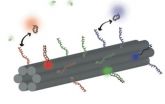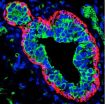Preterm birth of mother increases risk of pregnancy complications
Risk almost double for women born under 32 weeks
2012-09-24
(Press-News.org) Women who were born preterm are at increased risk of complications during pregnancy compared to those born at term, and the risk almost doubles for mothers born before 32 weeks, according to a study in CMAJ (Canadian Medical Association Journal).
Pregnancy complications include gestational diabetes, gestational hypertension, and preeclampsia or eclampsia.
The findings are based on a study of 7405 women born preterm and 16 714 women born at term between 1976 and 1995 in the province of Quebec. Of the preterm women, 554 were less than 32 weeks at birth and 6851 were at 32 weeks' gestation.
"We found that the risk of pregnancy complication was significantly higher among women born preterm, independently of their own fetal growth," writes Dr. Anne Monique Nuyt, Sainte-Justine University Hospital and Research Center, University of Montréal, with coauthors. "When divided into categories of gestational age, the risk of having at least 1 pregnancy complication nearly doubled among women born before 32 weeks' gestation versus those born at term."
For the women born at less than 32 weeks, 19.9% had at least 1 pregnancy complication compared with 13.2% for those born between 32 and 36 weeks and 11.7% for those born at term.
Women who were born small for gestational age, whether preterm or term, were also at greater risk of complications during pregnancy, a finding reported in other studies. When the researchers controlled for education level, they still found that the risk of complications increased with decreasing gestational age. Chronic hypertension and type 2 diabetes were also more frequent among the women born preterm, even though the cohort studied was still relatively young (maximum age 32 years), which is also a new finding reported by this study. However, when the researchers controlled for these conditions (which are known to increase the risk of pregnancy complications), the risk of pregnancy complications remained significantly higher in women born preterm.
Over the past 30 years, significantly more babies born before 32 weeks' gestation have survived, which may mean that a larger population will be at risk of hypertension, type 2 diabetes and health issues related to these diseases.
The authors suggest that the higher rates of pregnancy complications in mothers may be linked to underlying conditions related to their preterm births.
"The impact of the patients' preterm birth on obstetric care should be taken into account in the care of pregnant patients, as well as in the allocation of resources in the health care system," conclude the authors.
INFORMATION:
END
ELSE PRESS RELEASES FROM THIS DATE:
2012-09-24
With more women in family medicine in Canada, what does this mean for the specialty and the profession, for patients and for society, asks a Salon opinion piece in CMAJ (Canadian Medical Association Journal).
Female family physicians (FPs) now outnumber males, with 50.6% of the profession now female; this trend will continue as older, mainly male, physicians retire. These changing demographics will have implications for the way medicine is practised and for patients. Female FPs practise differently than men, working fewer hours (47 v. 52), seeing fewer patients but with ...
2012-09-24
Castrated men living in Korea centuries ago outlived other men by a significant margin. The findings, reported in the September 25 issue of Current Biology, a Cell Press publication, suggest that male sex hormones are responsible for shortening the lives of men, the researchers say.
The evidence comes after careful study of genealogy records of noble members of the Imperial court of the Korean Chosun dynasty (AD 1392-1910).
"This discovery adds an important clue for understanding why there is a difference in the expected life span between men and women," said Kyung-Jin ...
2012-09-24
Small proteins in the cornea protect against bacterial infection
Exposed tissue surfaces, including skin and mucous membranes, are under constant threat of attack by microorganisms in the environment. The layer of cells that line these areas, known as epithelial cells, are the first line of defense against these pathogens, but the underlying molecular mechanisms that allow them to repel microbes are unknown. In this issue of the Journal of Clinical Investigation, researchers at the University of California, Berkeley, report that epithelial cells in the cornea, which ...
2012-09-24
Exposed tissue surfaces, including skin and mucous membranes, are under constant threat of attack by microorganisms in the environment. The layer of cells that line these areas, known as epithelial cells, are the first line of defense against these pathogens, but the underlying molecular mechanisms that allow them to repel microbes are unknown. In this issue of the Journal of Clinical Investigation, researchers at the University of California, Berkeley, report that epithelial cells in the cornea, which is highly resistant to bacterial infection, express small antimicrobial ...
2012-09-24
VIDEO:
This movie shows a pregnant chimpanzee undergoing an ultrasound imaging procedure to explore brain growth in her fetus.
Click here for more information.
Humans' superior brain size in comparison to their chimpanzee cousins traces all the way back to the womb. That's according to a study reported in the September 25 issue of Current Biology, a Cell Press publication, that is the first to track and compare brain growth in chimpanzee and human fetuses.
"Nobody knew ...
2012-09-24
This press release is available in French. Women who were born premature are more likely to have pregnancy complications than women who weren't, according to data analyzed by a team lead by Dr. Anne Monique Nuyt, a neonatal specialist and researcher at the Sainte-Justine Mother and Child University Hospital Center and University of Montreal. This is the first study to clearly show the impact of preterm birth (i.e. before 37 weeks of gestation) itself on pregnancy risks. "We knew that to be born with a low birth weight could be associated with increased risk of pregnancy ...
2012-09-24
TEMPE, Ariz. – Scientists at Arizona State University have discovered that ants utilize a strategy to handle "information overload." Temnothorax rugatulus ants, commonly found living in rock crevices in the Southwest, place the burden of making complicated decisions on the backs of the entire colony, rather than on an individual ant.
In a study published in the early, online version of scientific journal Current Biology, Stephen Pratt, an associate professor in ASU's School of Life Sciences in the College of Liberal Arts and Sciences, and Takao Sasaki, a graduate student ...
2012-09-24
VIDEO:
DNA origami is a process that can be used to self-assemble shapes that are of nanometer dimensions -- 100 nanometers is about 1,000 times shorter than the width of an...
Click here for more information.
BOSTON, September 24, 2012—Much like the checkout clerk uses a machine that scans the barcodes on packages to identify what customers bought at the store, scientists use powerful microscopes and their own kinds of barcodes to help them identify various parts of a cell, ...
2012-09-24
New York, NY and Uppsala, Sweden, September 24, 2012 – Death plays a big role in keeping things alive. Consider the tightly orchestrated suicide of cells--a phenomenon essential to everything from shaping an embryo to keeping it free of cancer later in life. When cells refuse to die, and instead multiply uncontrollably, they become what we call tumors. An intricate circuitry of biochemical reactions inside cells coordinates their self-sacrifice. Tracing that circuitry is, naturally, an important part of cancer research.
In a major contribution to that effort Dr. Ingvar ...
2012-09-24
SAN DIEGO (Sept. 24, 2012) – Healing touch combined with guided imagery (HT+GI) provides significant clinical reductions in post-traumatic stress disorder (PTSD) symptoms for combat-exposed active duty military, according to a study released in the September issue of Military Medicine.
The report finds that patients receiving these complementary medicine interventions showed significant improvement in quality of life, as well as reduced depression and cynicism, compared to soldiers receiving treatment as usual alone.
The study, led by the Scripps Center for Integrative ...
LAST 30 PRESS RELEASES:
[Press-News.org] Preterm birth of mother increases risk of pregnancy complications
Risk almost double for women born under 32 weeks


